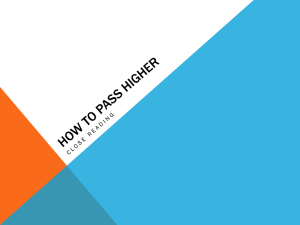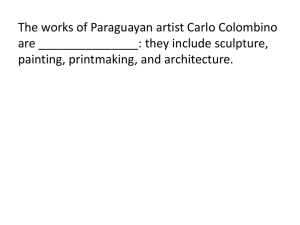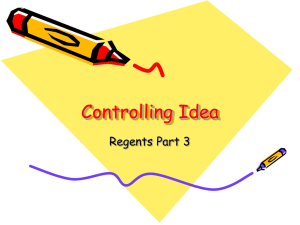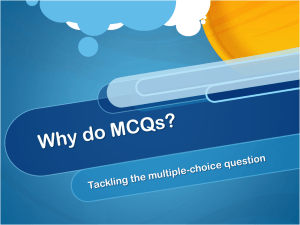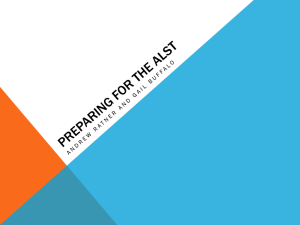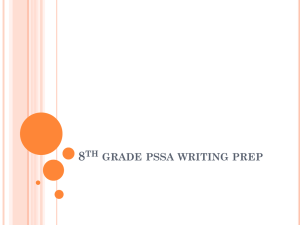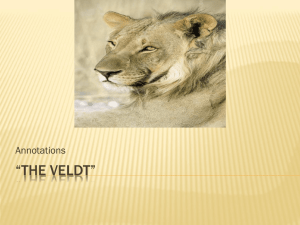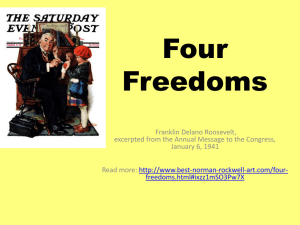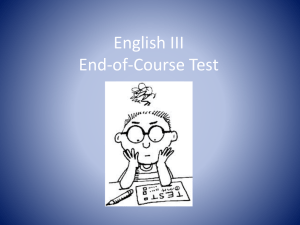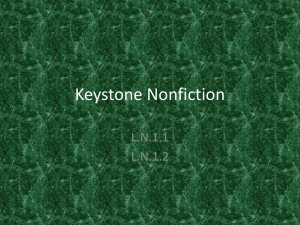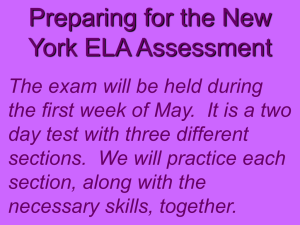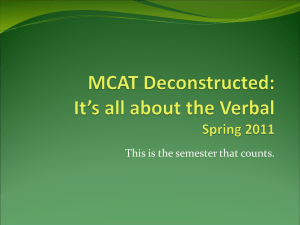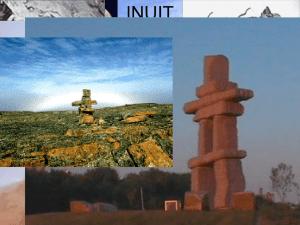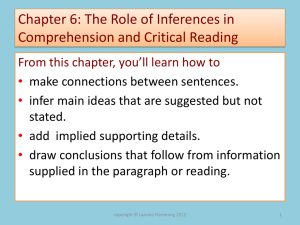Higher 2011 close reading - understanding
advertisement
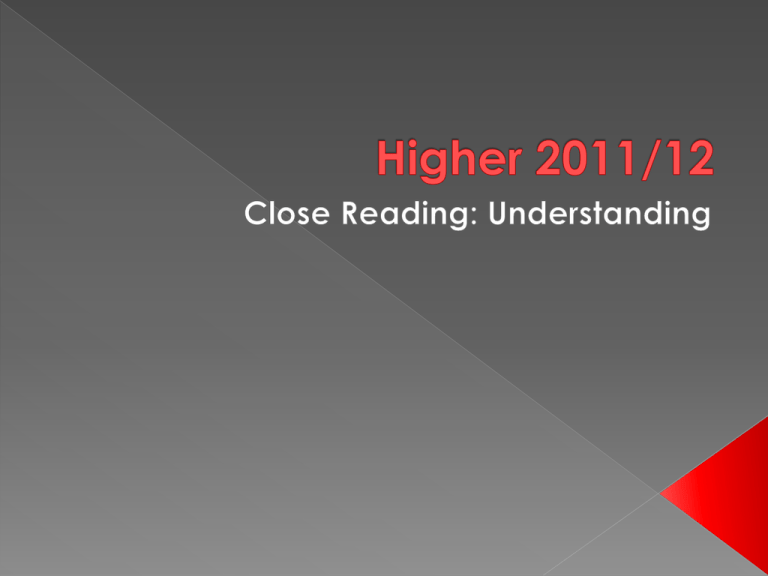
Question Types Understanding Analysis Evaluation There are five types of Understanding questions: Meaning Identifying Parts Following arguments and tracing developments Summarising a number of points Links This is the simplest type of understanding question if you recognise the words or phrases that are being asked about. This kind of question usually begins with one of the following: Explain what the writer means by… Explain the significance of the word… Show how you are helped towards the meaning of… How does the context help you to understand the meaning of… Explain this expression in your own words… One reason why British theatre is less stuffy now than it was before the Second World War is that classes or groups who in the 1930s would not often have gone to the theatre, the young, the students, the more articulate layers of the working classes and the people of working class origin who have been to university, all have more money in their pockets. Explain clearly in your own words what the writer means by ‘the more articulate layers of the working classes’. (2U) The key idea would be that the ‘working class’ would be the poorer people who maybe lack a finer education and cultured life. The more ‘articulate layers’ would be those who – like say a wedding cake – rise above the others, for example they are more educated and cultured than those below and thus are more open to theatre and the arts. And if you despise politics altogether, and are an Alternative Society enthusiast, well what was Robin Hood but a drop-out, and what could his greenwood enterprise have been but an early form of commune? Give the meaning of the expression ‘Alternative Society’ and explain how the context helps the reader to arrive at the meaning. (2U) You get the marks for showing how the context helped you to arrive at the meaning of ‘alternative society’. The words ‘drop-out’ and ‘commune’ are both associated with a kind of ‘hippie’ culture so these should help you arrive at the understanding that it is a social organisation which differs from the conventional structure. The Inuit, who sometimes see themselves as still not quite separate from the animal world, regard us as a kind of people whose separation from it may have become too complete. They call us, with a mixture of incredulity and apprehension, ‘the people who change nature’. And indeed what we now decide to do in the north with their land has a certain kind of frightening irrevocability about it. What does the phrase ‘a mixture of apprehension and incredulity’ imply about how the Inuit feel about western technology and its effect on their land? (2U) The Inuit feel afraid about it and they find it unbelievable that we should want to do it. ‘Apprehension’ and ‘incredulity’ have been translated and related to the feelings of the Inuit. They are clearly anxious/nervous about developments as well as being angry/shocked. Recently I found myself unimpressed by some visiting American who stunned me with monstrous verbosity, determined to use five words where one would do, bent on calling a canteen an ‘in-plant feeding situation’ and a spade ‘a primitive earthbreaking implement’. Show how the context of ‘monstrous verbosity’ helps you to arrive at its meaning. (2U) ‘Monstrous verbosity’ means an appalling number of worthless words. ‘Five words where one would do’ shows that there were too many words – and the phrases quoted such as ‘in-plant feeing station’ show how pointless the words are. 1 mark for correct meaning, 1 mark for correct use of context. Summary Make sure that you try to ‘translate’ the difficult words. 2. If you are asked to consider a context give both the meaning and its relationship to the context. 1. This type of Understanding question is one where you want to make the most of your chances, because it is usually quite straightforward. It is the kind of question which starts with something like: What are the three reasons for... What four things, in their view, do they expect... What three main reasons does the writer give for... What other ways of looking at education are laid out... The BBC is a massive patron, uniquely independent through its licence fee – and the guardian of public service broadcasting. But, as the fight for the control of communications hots up, friends of the BBC – both inside and out – are alarmed that all this is in jeopardy: the BBC has become too much of a self-seeking institution, too preoccupied with its ratings at the expense of good broadcasting, and unwisely overextended financially. What are the three reasons for causing alarm to the friends of the BBC? Use your own words as far as possible. (3U) This is am easy example. You can see where the idea ‘are alarmed’ is in the paragraph. The there is a colon, which tells you that there is going to be an explanation following, and there are two commas dividing the explanation into three parts. There three parts are going to give you your answer. The BBC has become too much of a selfseeking institution 2. ...too preoccupied with its ratings at the expense of good broadcasting 3. ...unwisely over-extended financially. 1. The urge to write may also be the fear of death – particularly with autobiography – the need to leave messages for those who come after, saying, ‘I was her; I saw it too’. Then there are the other uses of autobiography, some more utilitarian than others – exposure, confession, revenge. In writing my first volume of autobiography ‘Cider with Rosie’, I was moved by several of these needs, but the chief one was celebration: to praise the life I’d had and so preserve it. What three main reasons does Laurie Lee give for writing autobiography in lines 1-6? (3U) The employers expect that: The working man should do his job efficiently and without question 2. The Inuit should behave like obedient workers anxious to please 3. They could provide ‘local colour’ by portraying the expected stereotype 4. The land is there to be exploited for all its products 1. You should be able to see that in this kind of question you have to do two things: Identify the part of the paragraph/sentence/phrase which contains each of the reasons/attitudes/changes/factors. 2. Show that you know what each means by using your own words (translating/paraphrasing/recasting) in your answer. 1. Do not simply write a list of answers. Because this is an Understanding question you need to show that you understand the possible reasons. The best way to do this is to put your answers into your own words. Summary 1. 2. Make sure you are looking at the correct section of the passage. You will always be given a line reference – e.g. ‘lines 23-31’. There is nothing worse that writing a brilliant answer only to find later that you have gone too far in the passage so that only half of it is relevant. Use your own words whenever possible and particularly when you are instructed to do so. If you don’t use your own words, if you simply ‘lift’ or quote straight from the passage, the marker of your paper is told to give you 0 marks. In this kind of question you could be asked to look at a sentence (probably a long, complex one), or a paragraph, or a section of the passage involving two or three paragraphs, or even the whole of one passage. The purpose of this kind of question is to see if you can understand and recognise the line of thought through a section of the passage. Questions usually have the word “explain” or “explanation” somewhere in them or sometimes even just “Why?” In a generation, living to 100 will be common. Society is still utterly unprepared for this change. Chatter about ‘grey power’, or even the growing and admirable concern for the old and helpless who are not cared for by families, have scarcely touched the problem. The old, still veiled in outworn stereotypes and new-fangled prejudice, are the Great Excluded. By referring to lines 1-4, explain fully the difficulties that such longevity causes. (2U) We as a society are not ready to deal with all the old people who will be alive in the twenty-first century and although there is a vague understanding of the potential difficulties, the old are not catered for yet in the thinking of planners of our social system. ...the source of the pride was simply this, that, in spite of everything, they had contrived to remain themselves. In later centuries, when the political rights of nationality had been sacrificed, first in part, them almost completely, the Scotsman’s most obvious means of asserting his country’s continues existence was to insist on it separateness, the uniqueness of Scottish scenes and Scottish customs. Human nature being what it is, this meant that, almost inevitably, he would also be found insisting that those things in Scotland in which he took particular pride were the best of their kind in the world. Read lines 3-8. using your own words, explain why and in what ways this pride changed in later centuries. (3U) Scottish political rights and independence disappeared over the centuries, and as a result of this the Scots had to fall back on boasting about the things they still had which were purely Scottish – the scenery and cultural habits – to give them a sense of their own nationality. Another way of asking this kind of question is to ask you to show the development of a word or idea. Often the idea in this question will be from the topic sentence of a paragraph, so you would expect the paragraph to go on to give you a more detailed or expanded version of the topic. It is important to look at the line references you are given in this kind of question. There will be a limit given as to how far you have to trace the development. This is necessary because any idea from the beginning of a passage is probably going to be developed right through to the end, so you need to know where to stop your answer. (This is from a passage about the influence of screen violence.) The question of media influence is properly understood as an environmental issue. At a time when we are demanding that industry takes more responsibility for its pollution of our air and our water, it’s entirely appropriate to insist that Hollywood and its like demonstrate greater accountability for their pollution of the cultural atmosphere we breathe. By referring to lines 1-4 show how the writer develops his statement that media influence is ‘an environmental issue’. (2U) He develops the idea by showing that we demand that the pollution caused by industry should be controlled because it damages the environment, so we should also demand that pollution in films (scenes of violence) should be controlled because it damages our society’s ideas and attitudes. (This passage deals with an atomic waste disposal site) As a condition for permitting the site to go ahead, the U.S. Congress has insisted that a warning sign should be erected when it closes down. This would have to be capable of alerting future generations to the risk of opening up this unwanted tomb. It would be the most momentous ‘Keep Out’ sign in history, a statement so forceful that it would drive people – or any other form of intelligent life – away from the area until AD 12,000. How is the idea contained in the word ‘momentous’ developed in the rest of that sentence? (lines 3-5) 2U The idea of ‘momentous’ is developed by saying that the sign has to do something really important – keeping everyone away from the place for thousands of years. And not just human beings, but any other form of life. 1. 2. Take account of all the material within the line references. ‘Explain fully’ suggests that you don’t just stop at the first idea – follow though to the end of the section you have been given. This kind of question asks you to look at quite a long section of a the passage and summarise a number of points. There are several ways of asking this kind of question and they can demand slightly different approaches. Identify five benefits... 2. Outline briefly the main effects... 3. Briefly summarise the main points... 4. Summarise the main reasons... 5. What do you think are the key reasons... 1. A good approach is to read the question carefully and know what it is you’re looking for before you read the section of the passage and to use a highlighter. Our gaze now shifts much nearer in the time corridor – to the invention of recorded sound. Though the early gramophone came into being in the 1870s as a result of the desire to record and reproduce speech, very soon its principal, almost monogamous marriage was with music. Thomas Alva Edison’s invention of recorded sound unleashed on the twentieth century a massive amount of music in a multitude of forms; it gave music wings to cross the planet. Before the gramophone age, people heard a particular piece of orchestral music maybe once or twice a decade. Now anything can be listened to, instantly, at the flick of a switch, the drop of a needle or the aiming of a laser. 150 years ago the very slowness of making a notated score of a piece of music meant that the creator had to live with it and think about it for a period of time before it was released to the world. Now a recording can be made instantaneously, even at the point of creation. Where one a catchy, impulsive melody made up on the spot and enjoyed for the evening would die the next morning never to be heard again, now everything can be captured for posterity. Using your own words as far as possible, identify five benefits the gramophone has brought to the world of music. 5U The gramophone allowed lots of music to be transmitted to the people of the twentieth century 2. It allowed music to move all across the world. 3. Any piece of music can be listened to exactly where and when you want to hear it. 4. A composer can record his compositions immediately instead of writing it down first. 5. Spontaneous music can be preserved for later listening 6. Musicians can have their best performances recorded with no mistakes thanks to editing. 1. Find out from the question what you’re looking for before you read these quite lengthy extracts. 2. Check whether you are being asked to list, or give reasons. 3. Make sure you are working within the correct area of the passage – don’t go too far. 4. Use your own words. 5. Marking off ideas on the paper can help. 1. This last type of Understanding question will ask you to look at several paragraphs and then explain how a line of thought is developed. Sometimes it can be as simple as one word or phrase: Now – this must be linking something from the past with the present. Later –must be the next stage of development. On the contrary – is going to provide an opposing view to what has gone before. But even more so – another point is introduced to back up a previous statement or idea. The 7.15 Latin dance is full, as was the six o’clock, as is the 8.30. In the reception area of Edinburgh Dancebase, learners, ranging from the middle-aged, fresh from work, to students, mill around waiting to dance. Unlikely as it may at first seem, this is occurring across the country. Against similar winter backdrops people are queuing up to learn to dance. National inhibition is being shed as salsa, merengue and cumbia beats force hips to sway rhythmically and partners to twist complicatedly. French ceroc classes are filling up, street dancing to hip-hop is being used as an exercise class. Even ballroom dancing is enjoying something of a renaissance. The sentence acts as a link in the line of thought because ‘this’ links back to the idea of the dance classes in Edinburgh being full and ‘is occurring across the country’ links forward to the ideas in the second paragraph as it goes on to say that this is happening in many different places throughout the nation. The problem here is political will rather than financial capacity. The pinch will come in other resource areas, such as health spending. People over 65 consume three times as many prescription items as other age groups. Nearly half of those with some measure of disability are over 70. But the resource question, meeting the material needs of the old elderly, is only half the story. The real problem lies elsewhere – in the imagination. What are the old for? Who are they, and do traditional divisions of human life into childhood, youth, middle-age and oldage still fit our experiences? Referring to specific words or phrases, explain how the sentence ‘But...story’ acts as a link in the writer’s line of thought. 2U The ‘resource question’ refers back to the problems of funding health care for the elderly, ‘is only half the story’ points forward to the rest of the paragraph which is going to look at the other half of the story – the real problems of identity in old age. The formula for answering this kind of question is to identify in the linking sentence two words of phrases, one pointing back and on pointing forward. You then have to link the backward pointing one with the relevant part of the previous paragraph, and the forward pointing one you have to link with the relevant parts of the following paragraph. Remember that link answers usually should have four specific parts.


